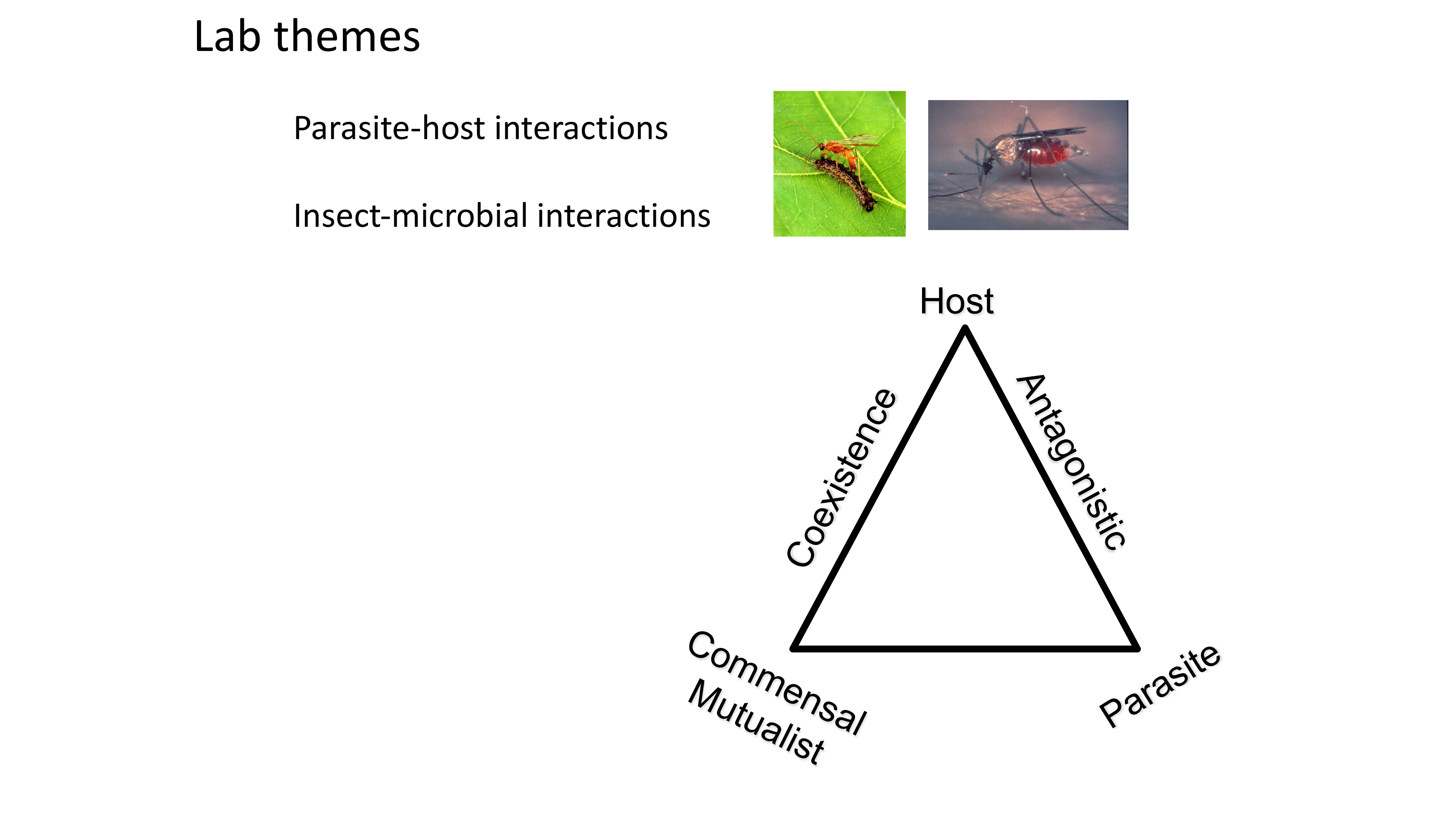-
Strand, Michael R.
Parasite-host interactions
Summary
The interactions between parasites and insects are critical to two areas of impact for the Land-Grant University System: 1) Nutrition and Health and 2) Agricultural Systems. Our studies impact Nutrition and Health by advancing understanding of vector insects that transmit human and animal diseases. Our studies impact the sustainability of Agricultural Systems by providing insights into the function of microorganisms that affect the populations of pest insects.
Situation
Vector insects transmit several diseases that impact human and animal health. Pest insects affect the profitability, production and sustainability of food and fiber production systems. The issues we study are: 1) how do insects that vector human and animal diseases develop and reproduce, 2) how do parasites and microbes cause disease and how can they be used to control insect pests, and 3) how do microbial symbionts benefit insects that are used to control pest species?
Response
Studies during the past year have focused on three study systems: 1) vector mosquitoes that cause human disease, 2) parasites and microbes that control populations of pest insects, and 3) microbes that promote the survival of beneficial insects that are used to control pest species. The first study system focuses on characterizing the role of microorganisms in mosquito development, reproduction and transmission of human disease organisms. Results this year further elaborated on the molecular mechanisms by which microbes in the digestive tract of mosquitoes regulate growth and molting. Studies indicated that gut microbes activate hypoxia transcription factors and other signaling pathways that regulate cell division and nutrient acquisition. Other studies showed that gut microbes can also biosynthesize essential nutrients that mosquitoes require for growth. These studies were conducted in collaboration with Drs. Mark Brown and Kevin Vogel at UGA. The second study system involves several microbial pathogens and insect pest species. Results last year identified a bacterium from the field that kills mosquito larvae. This year we identified this bacterium as a species in the genus Chromobacterium while functional studies provided insights into how this agent infects and kills several species of mosquitoes but does not kill several other types of insects. Bacterial symbionts associated with aphids were successfully cultured for the first time and multiple strains were genetically characterized last year while results this year further analyzed the function of particular genes and certain types of viruses that infect . These studies were conducted in collaboration with Drs. Mark Brown and Kerry Oliver at UGA. The third study system focused on parasitoid wasps that are used in biological control of several pest insect species, and which rely on viral symbionts to parasitize hosts. Results included the full genome sequencing of a parasitoid wasp named Microplitis demolitor and analysis of a family of viral genes with functions in infecting insect cells. These studies were conducted in collaboration with Dr. Gaelen Burke at UGA and collaborators in Europe and China.
Impact
Research impacts include new insights on several topics related to insect-microbial interactions, development, and reproduction. Outcomes in 2018 were published in 9 articles published or currently in review in refereed journals and 2 book chapters. Educational impacts include training of five graduate students, six post-doctoral associates and multiple undergraduate students. Service impacts include appointments to multiple journal editorial boards, editor for three journals (Proc. Natl. Acad. Sci USA, Insect Biochem. Mol. Biol., Insect Sci.) and appointment as Chair of a grant evaluation panel at NIH (Vector Biology) for studies of vector insects that transmit human disease. I am PI or co-PI on multiple competitive research grants from NIH and NSF. I serve as co-PI on 2 training grants from NIH, and one Research Experience for Undergraduates (REU) grant from NSF. These awards support undergraduate, graduate student and post-doctoral research at UGA and collaborating institutions. I also serve on two committees for the National Academy of Sciences that are related to the mission of the National Research Council.
State Issue
Other Programming
Details
- Year: 2018
- Geographic Scope: International
- County: Clarke
-
Program Areas:
- Agriculture & Natural Resources
Author
Collaborator(s)
CAES Collaborator(s)
- Brown, Mark R.
- Burke, Gaelen R
- Oliver, Kerry M
- Vogel, Kevin J
Research Impact

